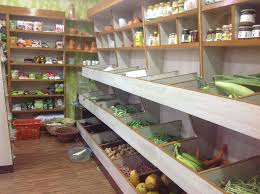Being eco friendly means living in a way that is not harmful to the environment. This way of life is becoming increasingly important, as we need to protect our planet from man-made damage.
Eco-homes are measured in multiple ways meeting sustainability needs such as water conservation, reducing wastes through reusing and recycling materials, controlling pollution to limit global warming, energy generation and conservation, and decreasing CO2 emissions.
In this way the first option to bring in eco friendly products in to our day to day life is through the first one of our necessities-
food, clothing and shelter.
The way to be eco friendly or being sustainable through food is to choose organic products and avoiding wastage.
WHAT IS ORGANIC ?
The word "organic" means the way farmers grow and process farming (agricultural) products. These products include fruits, vegetables, grains, dairy products such as milk and cheese, and meat.
WHY ORGANIC?
Chemicals such as synthetic fungicides, herbicides, and insecticides are widely used in conventional agriculture and residues remain on (and in) the food we eat. Organic food is often fresher because it doesn't contain preservatives that make it last longer.
BENEFITS OF ORGANIC FARMING:
Organic farming practices are designed to meet the following goals:
- Improve soil and water quality
- Cut pollution
- Provide safe, healthy places for farm animals (livestock) to live
- Enable natural farm animals' behavior
- Promote a self-sustaining cycle of resources on a farm
Materials or methods not allowed in organic farming include:
- Artificial (synthetic) fertilizers to add nutrients to the soil
- Sewage sludge as fertilizer
- Most synthetic pesticides for pest control
- Using radiation (irradiation) to preserve food or to get rid of disease or pests
- Using genetic technology to change the genetic makeup (genetic engineering) of crops, which can improve disease or pest resistance, or to improve crop harvests
- Antibiotics or growth hormones for farm animals (livestock)
HOW ARE ORGANIC PRODUCTS CERTIFIED?
Produce can be called organic if it's certified to have grown on soil that had no prohibited substances applied for three years prior to harvest. Prohibited substances include most synthetic fertilizers and pesticides.
The most commonly purchased organic foods are fruits, vegetables, grains, dairy products and meat. Processed organic products are also available, such as sodas, cookies, and meat substitutes. Organic foods are produced through farming practices that only use natural substances.
HOW TO REDUCE FOOD WASTE?
Whether it’s old packaging, rotten food, or plastic junk, household trash quickly accumulates. You can reduce the waste generated by your household by buying food in bulk, reusing and repurposing old bottles and containers, engaging in less consumerism, and composting. A lot of old food scraps lying about can be composted to create nutrient-rich soil. Shop organic products, try to reduce waste and step ahead for an eco friendly home.
(This blogpost is a part of Blogchatter's CauseAChatter)



No comments:
Post a Comment